People are going back and forth across the doorsill where the two worlds touch. The door is round and open. Don't go back to sleep. -Rumi
Mid-October.
A river of psychedelic pink begins floating through the feeds of everyone’s phones; I hear it described before I look for myself. Something about have you seen the sky, no no, it’s in New York, it’s in fucking Westchester! I am at a beloved friend’s birthday dinner in Greenpoint, and all of my energy is focused on attempting to have actual conversations with actual people, people I care deeply about but have mostly not seen, many for years, some since before the…well, you know,
BEFORE.
News of the sky is a murmur, therefore, relegated to a background din, swallowed by kid catchups, Kamala-casting, and middle-aged malady comparisons. To say my social muscles have atrophied in recent years is an understatement. I’m reminded that night, though, it isn’t just me. There is a franticness in speech. Sustained eye contact seems straining. All of it is very loud. How it seems is, of course, entirely dependent on my particular lens, which necessarily includes an extreme sensitivity to the most remote stimuli and a bunch of excited humans who love each other in an intimate space means a kind of overwhelm — documentable through Apple’s recording of my heart-rate that night — to my always hyper-attuned nervous system…
—
Last February.
Wooly Mammoths begin running wild on Facebook, clopping along through a landscape of blowing snow; Cherry blossoms whoosh by, drone-like, as a couple walks along what appears to be Tokyo’s wintery streets. Hybrid mini-monsters watch woefully while a candle ominously collapses into itself.
None of it exists. Not in reality, anyway. And, right around then is when I was diagnosed with what the psychiatric literature commonly refers to as the BTMFC.
The Big-Time Motherfucking Creeps.
OpenAI, the same company behind ChatGPT and the still-image generator DALL-E, presented us a sample of their text-to-video artificial intelligence. The team behind the technology called it Sora, after the Japanese word for sky, saying in an interview they chose this name because it “evokes the idea of limitless creative potential.”
They are still working to understand the system’s dangers, they also said.
—
For years.
The amount of downward-facing dead-eyedness we’re doing as a species disturbs me. I mean, it disturbs me a lot. I’m probably extrapolating to the whole species because I’m terrified of how much I do it myself. But it is almost all of us most of the time, right? Just by observation, on any given elevator or subway ride, in line at the grocery store, waiting for anyone or anything anywhere to arrive. Why wait or wonder when you can scroll? There’s a cartoon showing the stages of man, how we dragged ourselves out of the mire into hunched-over ape-itude and finally figured out tools, enough to eventually become upright, only to be tech-necking our way back down into this morass of our own making.
What we spend most of our time looking at now is unnatural. A six-inch hunk of robots holds the vast majority of our gaze, which means the 16 billion or so transistors that control our attention sit in between us and our given home. This frenzied pitch about the rise of AI and how it will take us all over as if it hasn’t already. As though the very process of writing this isn’t repeatedly interrupted by red underlines telling me I’m making a mistake, and now, because I got a free upgrade, blue lines suggesting what a better sentence would be. I mostly ignore these because when I quoted Toni Morrison in a previous piece, the blue line offered improvements for her Pulitzer Prize-winning word arrangements, too.
Listen.
I don’t know much about most things, particularly about artificial intelligence. But even a dummy like me can see that it’s only a matter of degrees, takeover-wise. It’s only a matter of time.
Our pot is nearly boiling; the water has been warm for a while.
—
August and April.
A total solar eclipse. In 2017, I viewed it from my building’s rooftop in lower Manhattan through a jerry-rigged Fruit Loops box a neighbor shared with me. The slow and then sudden daytime darkness is—in the dictionary definition of the word—awesome. Another one early last Spring. I watch it with scores of New Yorkers at the Brooklyn Botanical Gardens. The gathering of souls sprawled across swaths of green, tucked in from the city’s rough edges by not-quite-blossomed cherry trees, is oddly intimate and moving, despite the celestial event itself being less dramatic than the one seven years ago.
It doesn’t matter.
On both occasions, I am more transfixed by the people around me, looking up, than what’s happening in the sky.
This is partly how I’m built. Hypervigilant. Tracking the condition of everyone in each moment, whether or not they seem okay. It’s a real problem a lot of the time, but like most maladaptations, there are benefits, too. A sensitivity to rhythms, a discernment for patterns. A perception of energetic shifts in ways others might miss. I can clock the collective pulse of any given room.
In the hours surrounding both eclipses, it felt definitive. Out of one thing and into something else. A down-regulation. Peaceful, steady, and pure. I experience it viscerally, but it’s also visible in the expressions of everyone around me. To a person, regardless of apparent race or apparent age, all are attuned. Calm. Reverent.
In some ineffable way, I’ve tried but can’t completely describe in a single word except to say:
Human.

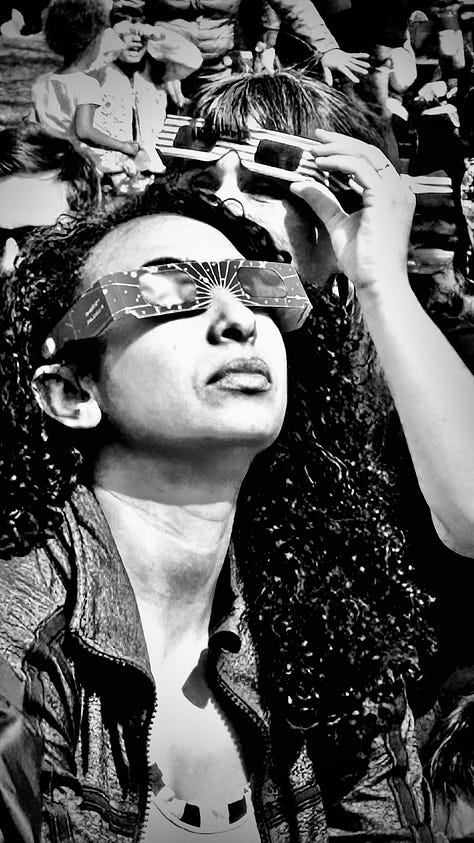



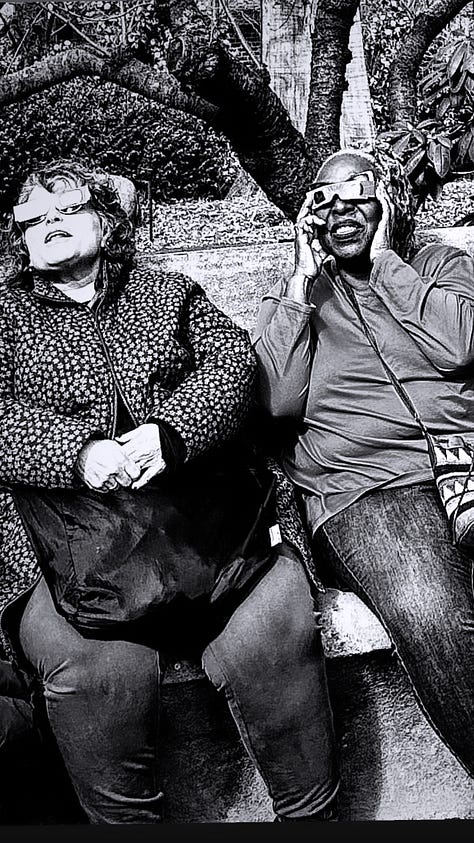
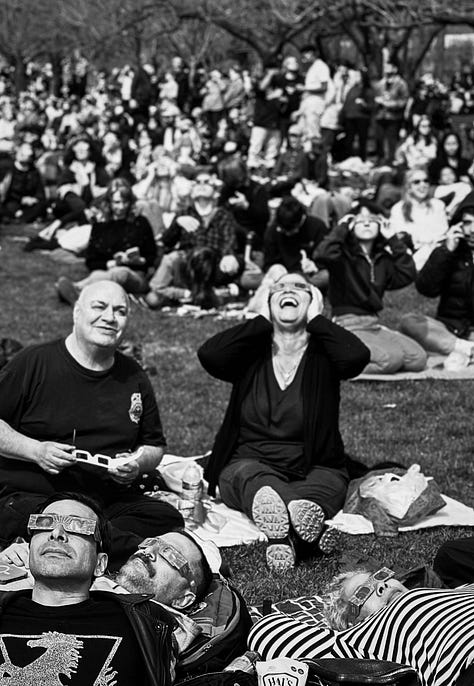
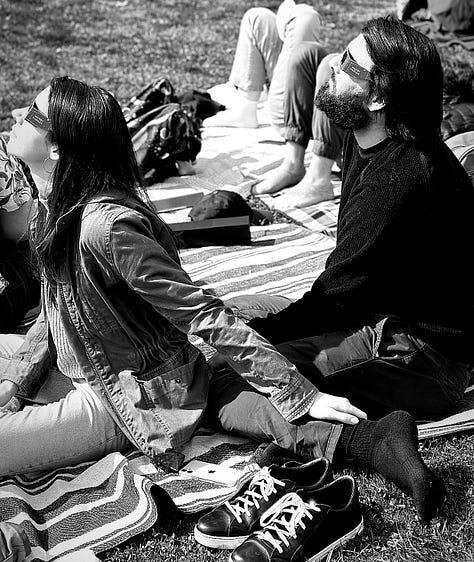

Out of curiosity, following the April eclipse, I prompt Dall-E to create variations of human beings looking toward the sky in awe. I try: A Woman, A Man, A Child, A Family, A Crowd. I try an older woman, and then an older man, because I like to be representative in my research. I changed ‘in awe’ to ‘with reverie.’
I try, ‘with a slight smile.’


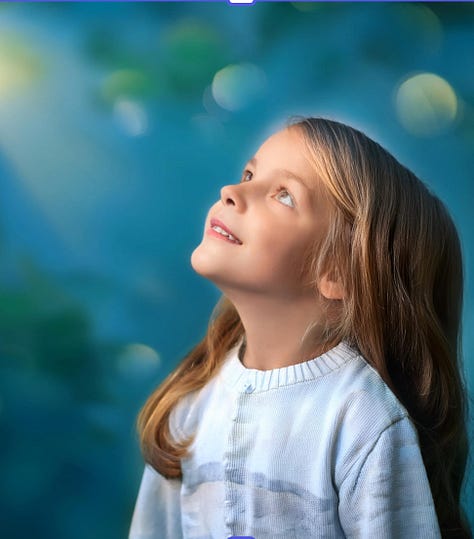




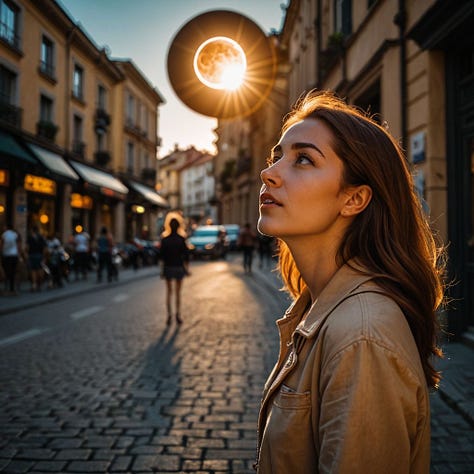
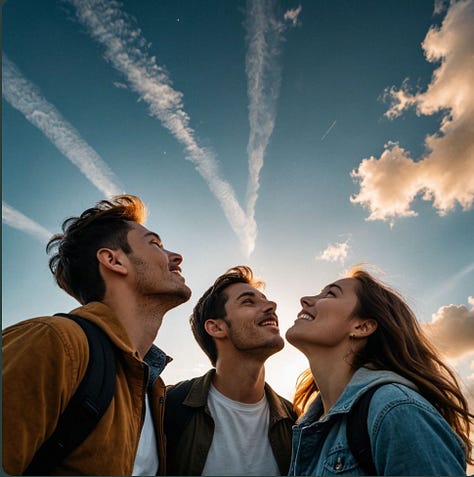
No is what I think in response to what I’m provided with.
This machine, whatever it is, can’t even position where a miracle in the sky should be located in relation to any human perceiving it.
It’s stupid, is what I think. Deranged, even.
—
With zero warning before changing how it functions, Google now answers any question with an AI-generated response. That seems an odd choice for a system still being trained, one that, according to its own engineers, may remain dangerous. After reading about Sora, I asked Google if the sky is, in fact, limitless.
No is the answer the robots give me, followed by a few bullet points indicating why. One of these introduces me to the Kármán line, which is the generally agreed-upon point at which our atmosphere ends and space begins. It’s the place where conventional aircraft can no longer effectively fly. The thing I discovered about this line, though, the further down the Google hole I go, past the intelligence identified as artificial, is that experts disagree on where precisely a distinct boundary lies. The limits of the sky are based on a combination of known physical reality and human constructs. Or, like every system put in place to keep society quasi-functional, the sense of reality we ascribe to it.
—
The flood of identical blocks of text, purporting to opt out of Meta’s use of personal data to train its AI, that arrived on Instagram stories a little while back caused me to physically wince. Compassion for the instinct to do it, pity knowing that posting anything on a digital platform is not a legitimate way to deny the monolithic tech Gods’ permission. A couple of months earlier, someone put a 14-step instruction guide on Facebook for how to opt out of training the Zuckerbots.
I’m a person who spent the last decade and a half posting their writing and photography on these platforms for free, so the idea of my work being lifted and fed into the mouth of an anonymous machine I do not even begin to comprehend is at once terrifying and enraging. I don’t know how to describe the dawning realization that this was already occurring without my agreement other than as a psychic violation. I followed the 14 steps, which were intentionally confusing, and took a considerable amount of time. A few weeks later, I received an email from Meta effectively stating that in the United States, no laws exist to make opting out of this artistic nightmare an actual option.
I mean, at least fucking Faust got something out of his bargain.
I have unchecked every box I can find anywhere on God’s green Internet to refuse anyway. No, you may not use my pictures or words to train your machines. Because this is mine. NO. You can’t just trawl me with a digital net, scooping up the way I see the world, how I take what I’ve found and then shape it, and hone it, and carefully give it to the people I love or believe care enough to look through my lens. But then I think: What’s the use? There will be robots. There already are. You are only reading this pile of thoughts thanks to robots. Chips and transistors, 0s and 1s. Or something like that.
I told you at the beginning: I don’t understand any of it, not really,
at all.
—
The chilly night I spent with my old friends in the compassionate low lights of a warm Brooklyn restaurant, when the flashes of electric color swam through our phones, turned out to be the occasion of a geomagnetic storm. The Aurora Borealis, or the Northern Lights, which I’m ashamed to admit I didn’t realize could be witnessed except in places like Norway or Alaska. It occurs when electrons from the sun interact with the Earth's magnetic field and collide with molecules in the atmosphere. According to my robots, the storm originated from a solar flare that erupted quite specifically out of Sunspot 3842 and was the strongest recorded in the past seven years.
—
A beautiful silhouette animation shows a wolf howling at the moon, feeling lonely, until it finds its pack.
A young man in his 20s is sitting on a piece of cloud in the sky, reading a book.
A petri dish with a bamboo forest growing within it that has tiny red pandas running around
Photorealistic closeup video of two pirate ships battling each other as they sail inside a cup of coffee.
A flock of paper airplanes flutters through a dense jungle, weaving around trees as if they were migrating birds.
New York City submerged like Atlantis. Fish, whales, sea turtles, and sharks swim through the streets of New York.
Extreme close-up of a 24-year-old woman’s eye blinking, standing in Marrakech during magic hour
A cartoon kangaroo disco




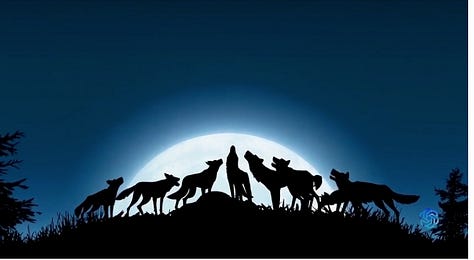
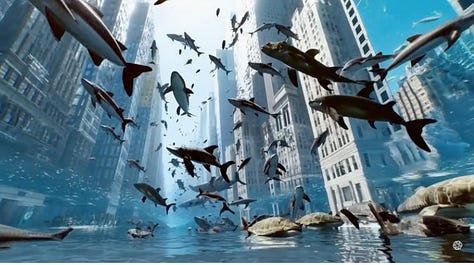



I read scores of them. These were some of the text prompts humans entered to make Sora create. I find them haunted. Filled with longing. I want to know why you need a machine to make you a bird. I want to know if it matters which book the young man is reading on his cloud. I want to know why you picture pirates battling in your breakfast drink, and who’s the captain now?
I want you to tell someone with a heartbeat about the lonely wolf howling at the moon whenever you close your eyes.
—
Tuesday, November 5th.
If you’ve made it this far, maybe you want me to say what the heavens and the robots, the text prompts, and human faces all have to do with what happens in America on Tuesday. I’m going to tell you right now.
We’re still working to understand the systems’ dangers. Artificial systems, yes, but in my personal opinion? Every system. All of them.
I want a leader who knows which limits are worth pushing past, and for what reasons. I want a President who, when she talks to a person, looks them in the eye, holds their hands, and allows them space if they’re frightened or grieving and begin to cry; I want a President who instinctively connects, who doesn’t need text prompts spelled out with a Sharpie to be capable of asking teenaged trauma survivors what can we do to help you feel safe or to come up with I hear you in response to their reply.
I need a person in charge who is human in a way that’s not fully articulable in words but which is equally impossible to deny.
—
I’ve been trying to explain something about reality: our capacity for perceiving it, our ability to distinguish between what’s true and what isn’t, our instincts and intuition for either or both, which are not necessarily the same.
I’m trying to tell you something about art and creation, about wondering and beauty, and about looking up at the sky. I’m trying to say something about making machines do things for us, things we might need to keep doing ourselves for the human species to survive. I don’t think I’m doing a good enough job.
I want you to see that every moment on this harrowing exquisite orb, spun out of darkness and stardust, borne from chaos and constant miracles, is a cartoon kangaroo disco if you look closely enough.





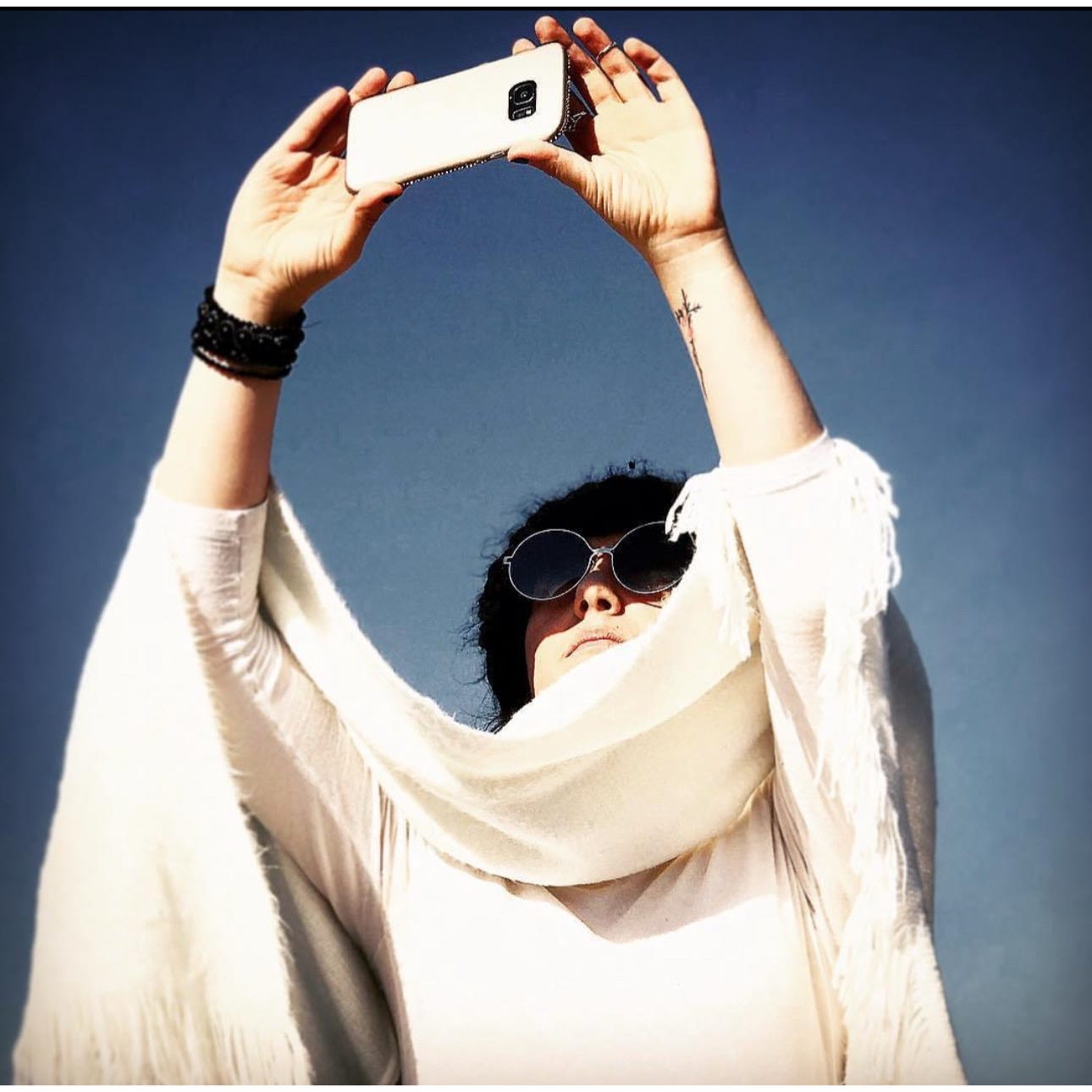
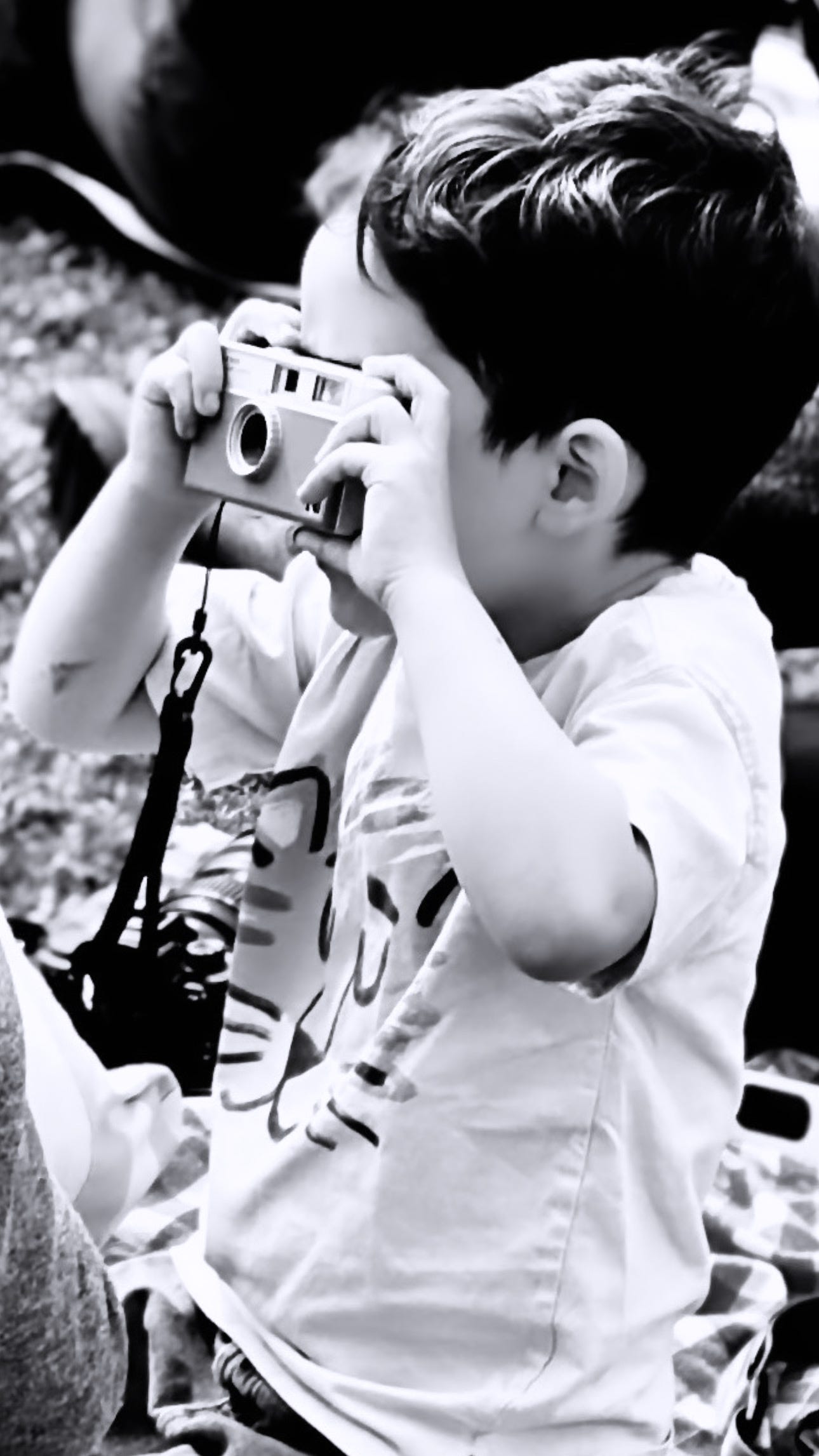

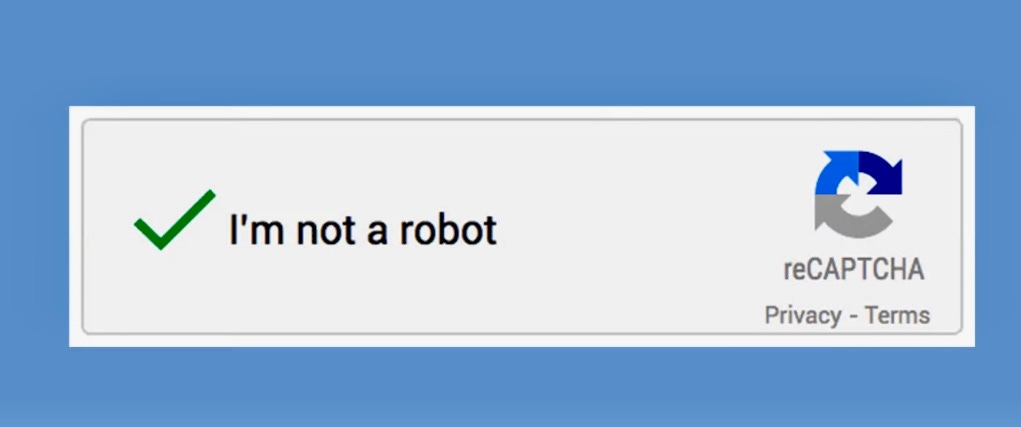



This is exactly what I needed to read right now. You are a beacon of light and love. Xoxo
Thank you for this astonishing piece.